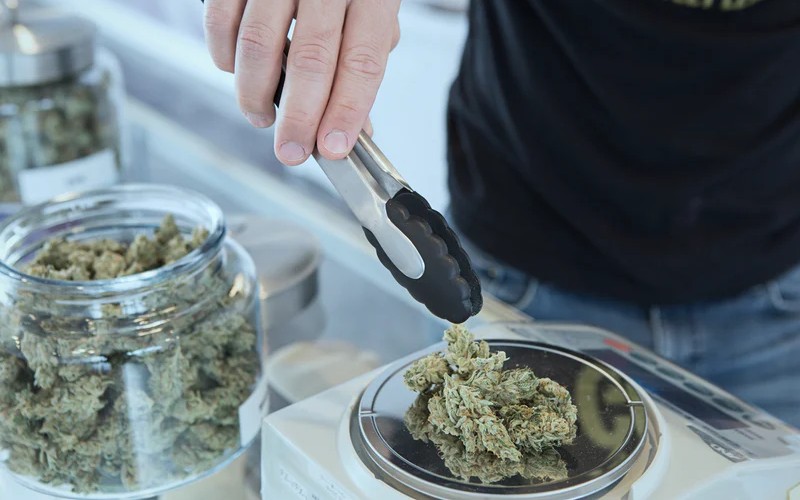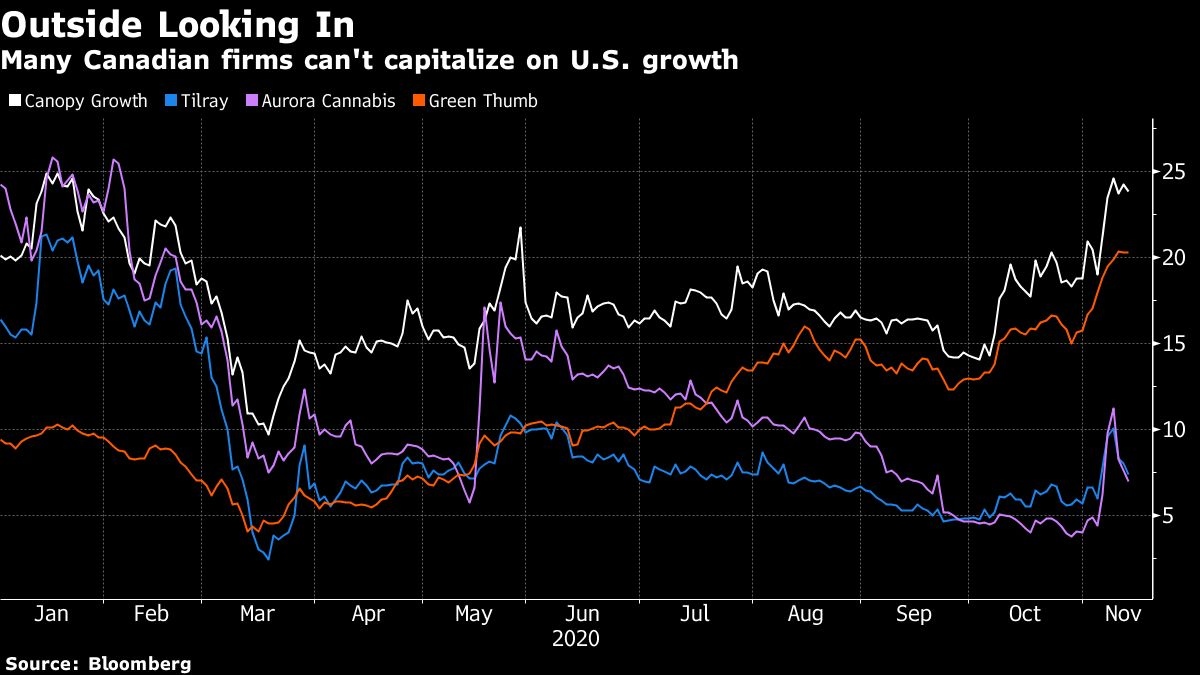Canadian firms look for ways in or around U.S.

Celebration over the legalization of cannabis in five more U.S. states was hardly over when attention turned to what this all means for industry heavyweights north of the border.
Several of the largest Canadian companies reported quarterly results last week, putting them under the microscope as Wall Street tries to figure out how they’ll grow while largely shut out of the rapidly expanding U.S. market. Some are finding ways in, while others are searching beyond.

Here’s a look at the strategy pivots laid out by a few prominent Canadian cannabis producers:
Canopy Growth
Canopy Growth Corp. Chief Executive Officer David Klein is focused on building a brand so strong and distinctive that consumers demand retailers carry it. The company already has a deal with Acreage Holdings Inc. to move into the U.S. within 60 days of federal legalization -- but with the prospects of Republican control of the U.S. Senate, the company probably can’t count on legalization anytime soon. In the meantime, Canopy has a consumer insights organization that’s gathering U.S. and Canadian data.
One goal is to develop products that have pleasant -- and consistent -- effects and flavors, he said. Canopy, which plans to produce cannabis-infused beverages, may try to emulate its majority shareholder, Corona beer maker Constellation Brands.
“Look at high-end beer,” Klein said in a phone interview. “You have to create those experiences and the brands that your consumers identify with. You have to make sure you get those experiences right.”
Aurora Cannabis
Pressed by analysts to articulate a pathway into the U.S., Aurora Cannabis Inc. had an entirely different approach. CEO Miguel Martin said he isn’t interested a partnership along the lines of Aphria’s recent deal with a craft brewery to get into the market.
“I don’t think we need it right now,” Martin explained in a phone interview. “I’ve been in the beer business, there’s not synergy there.”
He instead raised an interesting analogy: Monsanto, known for genetically modified crops. Aurora sees its intellectual property, which can help improve crop yields and grow desirable strains of the plant, as a major differentiator.
There’s no advantage in trying to get into the U.S. early to do brand-building now because consumers are finicky, he said. “If the U.S. is to legalize, there will be a lot of consumer testing and tasting and seeing where you want to be.”
Tilray
For Tilray Inc., North America isn’t even the main focus. CEO Brendan Kennedy instead emphasized pharmaceutical partners around the world, including big names like Novartis. He said Tilray is registering pharmaceutical products in Croatia, where it’s working with the government, and in Australia New Zealand and Latin America, where it has local partners.
“When I think about the long-term opportunity, I don’t focus on the 37 million people in Canada,” Kennedy said. “I’m much more focused on the 700 million people in Europe.”
420 Intel is Your Source for Marijuana News
420 Intel Canada is your leading news source for the Canadian cannabis industry. Get the latest updates on Canadian cannabis stocks and developments on how Canada continues to be a major player in the worldwide recreational and medical cannabis industry.
420 Intel Canada is the Canadian Industry news outlet that will keep you updated on how these Canadian developments in recreational and medical marijuana will impact the country and the world. Our commitment is to bring you the most important cannabis news stories from across Canada every day of the week.
Marijuana industry news is a constant endeavor with new developments each day. For marijuana news across the True North, 420 Intel Canada promises to bring you quality, Canadian, cannabis industry news.
You can get 420 Intel news delivered directly to your inbox by signing up for our daily marijuana news, ensuring you’re always kept up to date on the ever-changing cannabis industry. To stay even better informed about marijuana legalization news follow us on Twitter, Facebook and LinkedIn.




